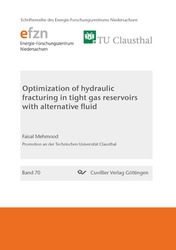| Fachbereiche | |
|---|---|
| Buchreihen (97) |
1381
|
| Nachhaltigkeit |
3
|
| Gesundheitswesen |
1
|
| Geisteswissenschaften |
2370
|
| Naturwissenschaften |
5407
|
| Ingenieurwissenschaften |
1798
|
| Allgemeine Ingenieurwissenschaften | 292 |
| Maschinenbau und Verfahrenstechnik | 863 |
| Elektrotechnik | 690 |
| Bergbau- und Hüttenwesen | 30 |
| Architektur und Bauwesen | 75 |
| Allgemein |
98
|
|
Leitlinien Unfallchirurgie
5. Auflage bestellen |
|
Erweiterte Suche
Optimization of hydraulic fracturing in tight gas reservoirs with alternative fluid (Band 70)
Faisal Mehmood (Autor)Vorschau
Leseprobe, PDF (490 KB)
Inhaltsverzeichnis, PDF (120 KB)
Due to the finite nature of petroleum resources and depletion of conventional reservoirs, the exploitation of unconventional resources has been a key to meeting world energy needs. Natural gas, a cleaner fossil fuel compared to oil and coal, has an increasing role in the energy mix. It is expected that the peak global natural gas production will remain between 3.7-6.1 trillion m3 per year between 2019 and 2060.
Therefore, addressing the technical challenges posed by reservoir exploitation technologies in an environmentally responsible manner is critical for efficient energy production and energy secure of the world.
| ISBN-13 (Printausgabe) | 9783736974722 |
| ISBN-13 (E-Book) | 9783736964723 |
| Buchendformat | A5 |
| Sprache | Englisch |
| Seitenanzahl | 160 |
| Umschlagkaschierung | matt |
| Auflage | 1. |
| Buchreihe | Schriftenreihe des Energie-Forschungszentrums Niedersachsen (EFZN) |
| Band | 70 |
| Erscheinungsort | Göttingen |
| Promotionsort | Clausthal |
| Erscheinungsdatum | 26.07.2021 |
| Allgemeine Einordnung | Dissertation |
| Fachbereiche |
Ingenieurwissenschaften
Umwelttechnik Energietechnik |
| Schlagwörter | alternative fluid, light alkanes, hydraulic fracturing, tight gas, proppants, fracture conduictivity, Leichtalkane, Fracking, Knallgas, Proppenstoffe, Konduktivität, Erdölressourcen, petroleum resources, Energiebedarf, energy needs, Erdgas, natural gas, fossiler Brennstoff, fossil fuel, Energiemix, energy mix, effiziente Energieversorgung, Energieerzeugung, Tight-Gas-Lagerstätten, dichte Gasspeicher, Grundwasserqualität, ground water quality, Frac-Flüssigkeiten, frac-fluids, n-Alkane, n-alkanes, Viskosität, viscosity, Hydraulic Fracturing, Kohlenwasserstoffindustrie, hydrocarbon industry, Muttergestein, source rock, Schadstoffe, pollutants, emissions, Emissionen, Diesel, Brückentechnologie, bridging technology, Global Energy Review, globale Energiebewertung, Stromsektor |








